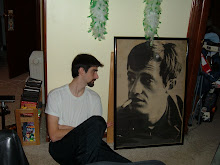Play The C Chord by Jason Martin
These friends of mine fill the lines
To put in the songs you like fill up your time
These friends of mine who write the lines
And put out the songs you like in half the time
Something's wrong if it's the old news
Play the C chord like it's something
Something's wrong if it's the old news
Play the C chord like it's something, like it's something
These friends of mine who write the lines
And put out the songs you like in half the time
Something's wrong if it's the old news
Play the C chord like it's something
Something's wrong if it's the old news
Just play the C Chord like it's something
Like it's something, like it's something
Like it's something new, you can sing through
What's this you might ask? It's a song of course. Sure you may never have heard the song, nor would you think that the lyrics fit in the pantheon of legendary status. But I do like to ask people what they think the words, play the c chord like it's something, means. The c chord, a staple of every ambitious guitarists dreams. A simple, comfortable, and often used chord. If you are piano inclined, middle c is where most people like to begin when learning piano. The triad comprised of c,e, and g, when struck, resound with quality that permeates home. So why the lyrics?
Look at your life. What do you do? Whatever you do, how do you do it? What separates the way you do, whatever it is, from everybody else? There are tools with which we work with, that personify who we are by how we use them. Whatever you are doing, and whatever tools you are using, are you using them in your own unique way or the way that someone has shown you? Maybe it's the most efficient way or the way that you've seen people have the most success with.
Look at the lyrics. Anyone can play the c chord. Anyone can write a song. But what are the motives behind the chord and behind the song. Surely the C chord is nothing new and wherever you are things may be all to familiar. There is an account of a man who tried to do something that no one had ever done before. He wanted to walk on water and for a moment he succeeded. Success came through the impossible, pierced through the doubt. Failure soon came with rationalization and fear. The account says that the man began to sink, not plunge into the depths.
I step onto the water....
Replacing God With Ghosts
10 years ago

